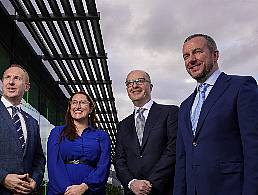A science career can be an incredibly fruitful one, but hindsight is always 20/20 vision. Is there anything you know now that you wish you knew when you started working in science?
If I could go back in time and tell myself something at the start of my career, it would probably be not to panic about mistakes – just learn how to handle them,
I don’t think that’s unique to my job or industry. I think everyone who becomes seasoned in their career learns that no good comes from having a meltdown when something goes wrong – because something can and will always go wrong. It’s how you deal with it afterwards that matters.
As we continue to champion science all through Science Week and explore the many career options available within the industry, I couldn’t help but wonder what those in the midst of their own science career wish they knew when they were starting out.
Similar to my own advice on making mistakes, one simple answer I received on Twitter was: “If everything is going well and working, something is wrong!”
Ailish McCartan is a senior scientist in Bristol-Myers Squibb (BMS). She said she wished she had known how many potential avenues there were out there for scientists in the pharma industry. “Selection of Leaving Cert subjects and college courses can be daunting, as you often worry whether you are going down the right path or whether you’ve pigeon-holed yourself,” she said.
“The reality is that if you are passionate and interested and a good team player, then you can explore any area you like. Once you are working within the industry, you’ll discover really interesting topics and roles that you never knew existed. And you’ll meet and become friends with fantastic people.”
McCartan added that she was fascinated by any news footage of scientists working in labs when she was little. “I wanted to be just like them. I’d like to think that I’ve fulfilled that dream.”
Dave Connolly is Shire’s head of manufacturing science and technology. Shire is a leading biopharma company aiming to help those living with rare diseases. Connolly said he wish he knew earlier in his science career about how much applied science could help society this way.
“I was immersed in science purely out if my own interest and I really enjoyed it. I always thought I would join academia, become a lecturer and teach,” he said. “When I got to understand the ‘applied’ side of science, the impact that it has on society and how it can improve the lives of so many people, that changed my mind on what I wanted to do with my career. Getting to see this earlier would have helped me with my career decisions.”
Marie McQuaid, a QA systems manager at BMS, said she wished she knew there is no ‘fixed’ path to take in a science career and that there are countless opportunities available in an ever-changing environment.
“When I look back at my science degree course, the career paths are endless. My fellow graduates now work in a multitude of industries across science ranging from biopharma, food and education right through to herpetology!”
McQuaid advised those who are just starting out their science career or interested in pursuing one in the future not to limit themselves by assuming they know what path they will take.
“You never know what opportunity is waiting around the corner,” she said. “Every day is a chance to learn something new and improve your knowledge no matter how much experience you have. And if you are open and willing to learn, doors will open to roles and experiences you never considered.”




